
oraciones para alabar al santísimo sacramento del altar pdf
Descubre hermosas oraciones y reflexiones para honrar al Santísimo Sacramento del Altar. Inspírate en la fe con estas palabras llenas de gratitud y amor.
Discover the profound significance of the Blessed Sacrament through heartfelt prayers, expressing faith, hope, and devotion. Explore traditional and modern prayers, including Actos de Adoración and letanías, available in PDF formats, to deepen your spiritual connection and adore Jesus in the Eucharist.

Overview of the Importance of Eucharistic Adoration
Eucharistic adoration holds a central place in Catholic devotion, offering believers a profound encounter with Christ’s real presence in the Blessed Sacrament. This sacred practice fosters a deepening of faith, hope, and charity, drawing individuals into a closer relationship with God. Adoration strengthens spiritual life, fostering gratitude, repentance, and a renewed commitment to living as disciples of Christ. It also serves as a source of grace, providing comfort, healing, and guidance in times of need. The act of adoring the Blessed Sacrament outside of Mass emphasizes the mystery of the Eucharist and its role in nurturing the Church. Through this devotion, Catholics worldwide find inspiration to live virtuous lives, united in prayer and worship. Eucharistic adoration is not only a personal act of love but also a communal expression of faith, enriching both individuals and the broader Christian community.

Significance of the Blessed Sacrament in Catholic Devotion
The Blessed Sacrament holds a profound significance in Catholic devotion, representing the Real Presence of Christ and the culmination of God’s love for humanity. It serves as a tangible encounter with the divine, fostering a deep spiritual connection and awe. The Eucharist is not only a sacrament but also a sacrifice, memorializing Christ’s passion, death, and resurrection. Catholics adore the Blessed Sacrament as an act of worship, gratitude, and surrender, recognizing it as a source of grace and transformation. This devotion strengthens faith, inspires virtue, and unites believers in a shared bond of love and reverence. The Blessed Sacrament is a beacon of hope, reminding the faithful of God’s enduring presence and mercy, and it remains central to Catholic prayer and liturgical life.

Prayers for Adoring the Blessed Sacrament
Experience profound adoration through traditional and modern prayers, including Actos de Adoración and letanías, to honor Christ’s Real Presence in the Eucharist and deepen your spiritual connection.
Actos de Adoración: Expressions of Faith and Devotion
Actos de Adoración are heartfelt expressions of faith and devotion, emphasizing the Real Presence of Christ in the Eucharist. These prayers, rooted in Catholic tradition, include acts of faith, hope, and charity, fostering a deep spiritual connection. Many prayers, such as “Creo que estás presente en el Sacramento del Altar” (“I believe you are present in the Sacrament of the Altar”), reflect a profound reverence for Christ’s sacrifice. Devotees often express their love and gratitude through adoration, acknowledging the transformative power of the Blessed Sacrament. These acts of worship, available in PDF formats, guide believers in expressing their devotion, offering a meaningful way to honor and praise Jesus in the Eucharist. Through these prayers, the faithful deepen their relationship with Christ, finding solace and strength in His divine presence.
Letanías al Santísimo Sacramento: Traditional and Modern Versions

Letanías al Santísimo Sacramento are devotional prayers that honor the Real Presence of Christ in the Eucharist. These litanies, rooted in tradition, use structured invocations and responses to express deep reverence and adoration. Traditional versions often include petitions like “Por la encendida caridad con que instituiste este divino Sacramento, líbranos, Señor” (“Through the ardent charity with which you instituted this divine Sacrament, deliver us, Lord”). Modern compositions maintain the essence of devotion while adapting language to resonate with contemporary spirituality. Both forms emphasize gratitude, repentance, and the pursuit of holiness. These prayers, available in PDF formats, provide a meaningful way to engage with the Blessed Sacrament, fostering a deeper connection to Christ’s sacrificial love and divine presence in the Eucharist.

Historical Context of Eucharistic Devotion
Eucharistic devotion traces its roots to early Christianity, evolving through centuries; Post-Vatican II, it adapted while maintaining reverence for the Blessed Sacrament, influenced by saints and historical figures who championed its significance.
The Role of the Blessed Sacrament in the Post-Vatican II Church

Following Vatican II, the Blessed Sacrament remained central to Catholic worship, though its role evolved. Some advocated reducing Eucharistic devotion outside Mass, yet the Church affirmed the importance of reserving the Sacrament for adoration. In moments of crisis, such as in Venezuela, the Blessed Sacrament became a symbol of hope and inspiration. Saints like Francisco Marto and Teresa de Lisieux emphasized adoration, reflecting its enduring significance. The Church reiterated that adoring Christ in the Eucharist is a fundamental duty, fostering spiritual growth and unity among the faithful. This period saw a renewed focus on the Sacrament as a source of strength and devotion, ensuring its place in Catholic spirituality remained unshaken.
Evolution of Eucharistic Adoration Practices
Eucharistic adoration practices have evolved over centuries, blending tradition with contemporary expressions of faith. Historically, adoration focused on silent prayer and contemplation, often in the presence of the exposed Sacrament. Post-Vatican II, there was a renewed emphasis on communal worship and liturgical participation, though private adoration remained vital. Today, devotional practices incorporate diverse prayer forms, such as Actos de Adoración and letanías, which express deep reverence and love for Christ in the Eucharist. The availability of prayer books in PDF formats has made these traditions more accessible, allowing believers to engage in adoration anywhere. Modern practices also emphasize personal reflection and intimacy with Jesus, inspired by the writings of saints like Teresa de Lisieux. This evolution reflects the enduring centrality of the Blessed Sacrament in Catholic spirituality, adapting to meet the spiritual needs of each generation while preserving its profound significance.
Notable Prayers and Their Authors
Notable prayers include works by Saint Teresa of Lisieux, who expressed deep love for Jesus in the Eucharist, and Fyodor Dostoevski, whose writings reflect profound reverence for the Blessed Sacrament.
Prayers from Saints and Prominent Catholic Figures
Saint Teresa of Lisieux is renowned for her deep devotion to the Blessed Sacrament, expressing her love through heartfelt prayers. Her writings emphasize the importance of adoring Jesus in the Eucharist, reflecting a profound spiritual connection. Similarly, Fyodor Dostoevski, though not a saint, wrote with reverence about the Sacrament, highlighting its divine presence. These prayers, often included in devotionals, inspire believers to deepen their faith and devotion. Many of these prayers are available in PDF formats, making them accessible for personal reflection and communal worship. They serve as powerful expressions of faith, hope, and charity, guiding individuals to a closer relationship with Christ in the Eucharist.
Practical Guide to Eucharistic Adoration
Prepare for a Holy Hour by fostering silence, modesty, and reflection. Pray with gratitude, adore Jesus in the Sacrament, and seek spiritual renewal through heartfelt devotion and quiet contemplation.
Preparing for a Holy Hour: Tips and Reflections
Preparing for a Holy Hour involves fostering a spirit of reverence and intentionality. Begin by creating a quiet, prayerful environment, free from distractions, to fully focus on the Blessed Sacrament. Reflect on your intentions, seeking to deepen your relationship with Christ. Consider using prayer books or PDF guides, such as those mentioned earlier, to structure your time with meaningful devotionals and reflections.
During adoration, cultivate silence and humility, allowing God to speak to your heart. Focus on acts of faith, hope, and charity, expressing gratitude for Christ’s presence in the Eucharist. Use prayers like the Actos de Adoración or letanías to guide your worship, ensuring your time is both personal and transformative.

Conclude your Holy Hour with a prayer of thanksgiving, asking for the grace to live out the fruits of your adoration in daily life. This sacred time is an opportunity for spiritual renewal and deeper communion with Jesus in the Blessed Sacrament.
Prayers of praise to the Blessed Sacrament offer transformative power, fostering a deeper connection with Christ. Through devotion and reflection, these prayers nurture hearts, inspiring gratitude and eternal love for Jesus in the Eucharist.

The Transformative Power of Praying to the Blessed Sacrament
Praying to the Blessed Sacrament holds immense transformative power, drawing believers into a profound encounter with Christ’s divine love. Through such devotion, individuals experience spiritual renewal, deepening their faith and fostering a more intimate relationship with Jesus. The Eucharist, as the real presence of Christ, becomes a source of strength, peace, and healing. Many have found solace in moments of difficulty by turning to the Blessed Sacrament, experiencing a profound sense of God’s mercy and grace. These prayers not only uplift the soul but also inspire acts of charity and selfless love, reflecting Christ’s own heart. The Holy Spirit works through this devotion, awakening hearts to the beauty of divine love. Regular adoration of the Blessed Sacrament invites believers to embrace a life of surrender, gratitude, and unwavering trust in God’s providence, leading to lasting spiritual transformation and a deeper commitment to living a life of faith.